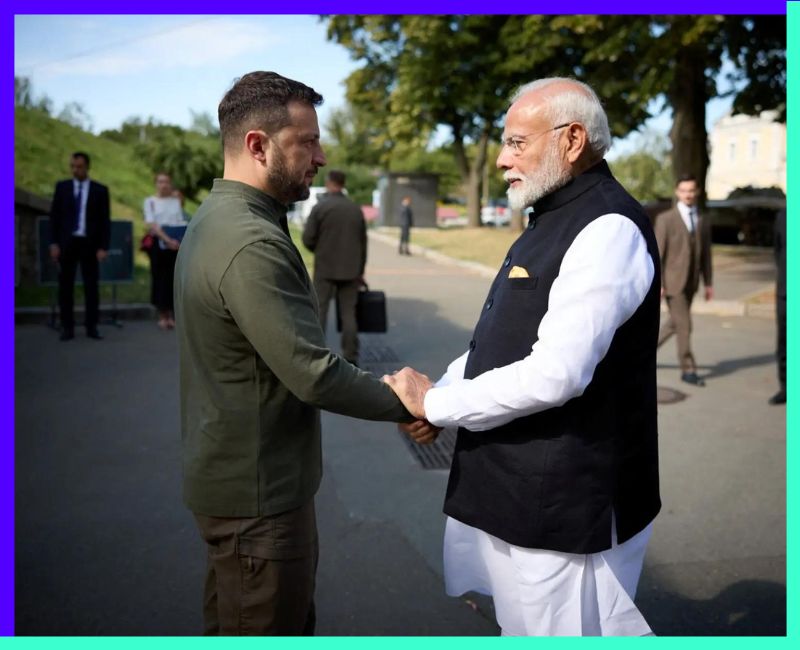In a significant diplomatic move, Indian Prime Minister Narendra Modi visited Kyiv on August 23, 2024, marking the first visit by an Indian leader to Ukraine in modern history. Amidst the ongoing conflict between Ukraine and Russia, Modi urged Ukrainian President Volodymyr Zelenskiy to engage in peace talks with Russia. His visit and the ensuing discussions have drawn global attention, especially given India’s historical ties with Russia and its evolving stance on the conflict.
Modi’s Call for Dialogue and Diplomacy
During his visit, Modi emphasized the importance of dialogue and diplomacy as the only viable path to resolving the conflict between Ukraine and Russia. He highlighted the urgency of initiating peace talks, stating, “The road to resolution can only be found through dialogue and diplomacy. And we should move in that direction without wasting any time. Both sides should sit together to find a way out of this crisis.”
Modi also offered India’s assistance in facilitating these discussions, positioning India as a potential mediator in the conflict. “I want to assure you that India is ready to play an active role in any efforts towards peace. If I can play any role in this personally, I will do that; I want to assure you as a friend,” Modi added.
Reactions from Ukraine
President Zelenskiy, in his regular address to the nation following Modi’s visit, acknowledged the importance of India’s role in the international community and its commitment to upholding international law. He expressed his appreciation for Modi’s tribute to the children killed in a Russian missile strike on a Ukrainian hospital in July.
However, Zelenskiy remained firm in his stance that any peace talks must align with Ukraine’s terms, emphasizing that “the matter of ending the war and a just peace are the priority for Ukraine.” Kyiv has consistently advocated for a resolution that respects its sovereignty and territorial integrity, rejecting any negotiations that would undermine these principles.
India’s Diplomatic Balancing Act
India’s approach to the Ukraine-Russia conflict has been complex and carefully calibrated. Historically, India has maintained close economic and defense ties with Russia, a relationship that has only deepened as Western nations have imposed sanctions on Moscow. Indian refiners have become some of the largest purchasers of Russian oil, accounting for over two-fifths of India’s oil imports.
Despite these economic ties, India has also publicly criticized the loss of innocent lives in the conflict. Modi’s visit to Kyiv can be seen as part of India’s broader strategy to position itself as a global leader capable of mediating complex international disputes.
Modi’s Visit Amidst Global Tensions
Modi’s visit to Kyiv followed a recent trip to Moscow, where he also called for peace and met with Russian President Vladimir Putin. This visit to Russia angered Ukraine, particularly as it coincided with a Russian missile strike on a children’s hospital in Kyiv. Zelenskiy publicly criticized Modi at the time, reflecting the strained relations between Ukraine and India.
Read More – Russia and Ukraine Agree to Prisoner Swap Deal Brokered by UAE
During Modi’s visit to Kyiv, the Indian leader renewed his condolences for the victims of the hospital strike. In a post on X (formerly Twitter), written in Ukrainian, Modi stated, “Conflict is particularly devastating for young children. My heart goes out to the families of children who lost their lives, and I pray that they find the strength to endure their grief.”
The Role of India in the Ukraine-Russia Conflict
India’s potential influence over Moscow was underscored by Mykhailo Podolyak, an adviser in Zelenskiy’s office, who noted that New Delhi “really has a certain influence” over Russia. Podolyak emphasized the importance of building effective relations with countries like India, which could play a crucial role in shaping the outcome of the conflict.
However, the question remains whether India, given its economic ties with Russia, can effectively mediate a peace process that aligns with Ukraine’s interests. As Western nations continue to distance themselves from Russia, India’s unique position as a major power with ties to both sides could be pivotal in any future negotiations.
The Road Ahead: Challenges and Opportunities
Modi’s visit to Kyiv comes at a critical juncture in the Ukraine-Russia conflict, with both sides entrenched in their positions. While Ukraine seeks to hold a second international summit to advance its vision of peace, Russia has categorically rejected talks following Ukraine’s recent incursion into Russia’s Kursk region.
India’s offer to mediate presents both challenges and opportunities. On the one hand, India’s close ties with Russia could enable it to influence Moscow’s stance in potential negotiations. On the other hand, Ukraine’s insistence on a resolution that respects its sovereignty may limit the scope of any talks that India could facilitate.
Prime Minister Narendra Modi’s historic visit to Kyiv underscores India’s evolving role on the global stage. By urging dialogue and offering India’s support in the peace process, Modi has positioned India as a potential mediator in one of the most complex and contentious conflicts of the 21st century. As the situation continues to evolve, India’s diplomatic balancing act will be closely watched by the international community, with significant implications for the future of the Ukraine-Russia conflict.
